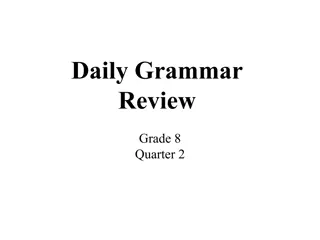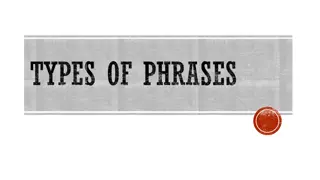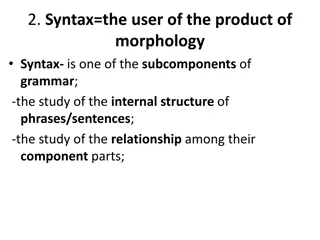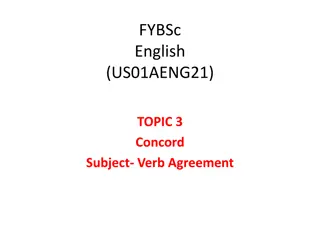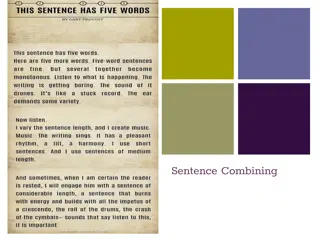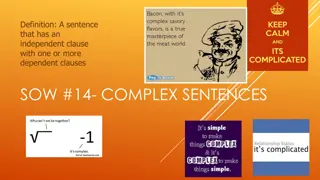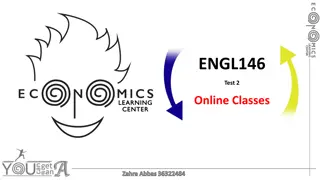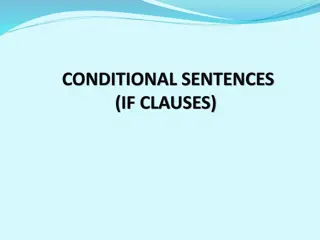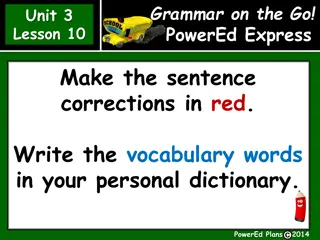Understanding Types of Sentences in English Grammar
Simple, compound, and complex sentences are fundamental components of English grammar. Simple sentences express a single complete thought, compound sentences combine two independent clauses with a conjunction, and complex sentences consist of an independent clause and one or more dependent clauses. Examples and explanations provided for each type help clarify their structures.
Download Presentation

Please find below an Image/Link to download the presentation.
The content on the website is provided AS IS for your information and personal use only. It may not be sold, licensed, or shared on other websites without obtaining consent from the author. Download presentation by click this link. If you encounter any issues during the download, it is possible that the publisher has removed the file from their server.
E N D
Presentation Transcript
3 Kinds of Sentences simple, compound, complex
SIMPLE SENTENCES It expresses a single complete thought that can It expresses a single complete thought that can stand on its own. stand on its own. A simple sentence contains a subject and a verb. A simple sentence contains a subject and a verb. EXAMPLES EXAMPLES . . The baby cried for food. The baby cried for food. There is a subject and a verb that expresses a complete thought.
SIMPLE SENTENCES EXAMPLES Professor Maple s intelligent students Professor Maple s intelligent students completed and turned in their completed and turned in their homework. homework. A simple sentence does not necessarily have to be short. It can have adjectives. In this case, there are two verbs completed and turned in. However, the sentence expresses one complete thought and therefore is a simple sentence.
SIMPLE SENTENCES EXAMPLES Megan and Ron ate too much and felt Megan and Ron ate too much and felt sick. sick. Although there are two subjects and two verbs, it is still a simple sentence because both verbs share the same subjects and express one complete thought.
COMPOUND SENTENCES COMPOUND SENTENCES A compound sentence has two independent clauses. An independent clause is a part of a sentence that can stand alone because it contains a subject and a verb and expresses a complete thought. Basically, a compound contains two simple sentences. These independent clauses are joined by a conjunction (and, but, or).
COMPOUND SENTENCES COMPOUND SENTENCES EXAMPLES They spoke to him in Spanish, but in English. This is a compound sentence that uses a conjunction to separate two individual clauses. but he responded
COMPLEX SENTENCES A complex sentence is an independent clause joined by one or more dependent clauses. A dependent clause either lacks a subject or a verb or has both a subject and a verb that does not express a complete thought. A complex sentence always has a subordinator (as, because, since, after, although, when) or relative pronouns (who, that, which).
EXAMPLES: EXAMPLES: After After eating lunch at The Cheesecake Factory, Tim went to the gym to exercise. The independent clause is Tim went to the gym to exercise. The subordinating clause before it is dependent on the main, independent clause. If one were to say after eating lunch at The Cheesecake Factory, it would be an incomplete thought.
EXAMPLES Opinionated women are given disadvantages in societies that that privilege male accomplishments. The subject is opinionated women and the verb is are given. The first part of the sentence opinionated women are given disadvantages in societies is an independent clause that expresses a complete thought. The following that privilege male accomplishments is a relative clause that describes which types of societies.
The woman who fired for stealing school supplies. The dependent clause in this sentence is who taught Art History 210 because if removed, the rest of the sentence would stand as an independent clause. Who taught Art History 210 is an adjective clause that provides necessary details about the subject, woman. who taught Art History 210 was



